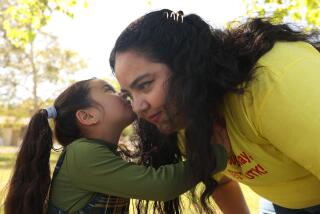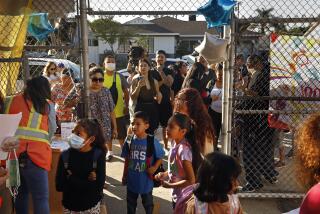‘What we are doing is asking these students to make life style changes now to prevent heart disease and other health problems in the future.’
- Share via
Ouch! There were lots of ouches and oohs but no tears--well, maybe one tear--last week at Juarez Elementary School in Cerritos, where students had their fingers pricked to draw small amounts of blood.
The blood will be analyzed to determine the cholesterol count which, when too high, is believed eventually to cause health problems, including clogging of the arteries and heart attacks.
“High cholesterol levels are believed to be a risk factor in heart disease in adults,” said Teri Book, an ABC Unified School District nurse.
“Not much is known about children but signs of problems have been found in children as early as 3 years old,” said Book, who is assigned to Juarez.
More than 115 students with parental approval volunteered to take the cholesterol test. The students had their blood taken last Friday. Test results will not be known before the end of this week.
Parents of students found to have a high cholesterol count will be informed and asked to plan lower fat diets for their children. Those parents also will be asked to volunteer to have their cholesterol levels tested and, if they are found too high, to have exercises and nutritional programs prescribed for them.
The American Heart Assn. says the cholesterol level should be under 200 milligrams for adults, said Book, who has a bachelor of science degree in nursing from California State University, Fullerton. She is working on a master of science degree in nursing from California State University, Long Beach.
“What we are doing is asking these students to make life style changes now to prevent heart disease and other health problems in the future,” Book said.
Most of the students--third and fifth graders--who had the tests done are part of a statewide pilot project to promote health and fitness among students.
The three-year pilot project, called the Comprehensive Health Education and Training Program, was created by Bill Honig, state superintendent of public instruction. Six school districts are participating, including two in the Greater Los Angeles area--ABC and Beverly Hills Unified School District. Each district was budgeted $50,000 for the first year.
The program consists of expanded health services for students as well as physical and nutritional education.
In classroom instructions, “We try to teach children to choose the more appropriate food. We teach them about the foods that are high in cholesterol and those that are low,” Book said.
The students learn that beef, liver, kidney and other animal products such as butter, whole milk, lard, cheese and egg yolk are high in cholesterol, while beans, pasta, turkey, chicken without the skin and fish are low in cholesterol, Book said.
The district purchased a blood chemistry analysis machine recently for $4,200 which will be used by Book to test the blood, said Kay Martin, ABC employee health and fitness coordinator.
Both Martin and Book said they did not want the cholesterol testing to be a negative experience for the students. So, aided by parent volunteers and school personnel, they came up with a few gimmicks.
Students who completed the test had “Snoopy” designed bandages placed on their fingers and were given badges that stated “Healthy Kids: Healthy California,” which is the theme of the statewide program. They also were allowed to join the “finger club” by signing a giant poster.
Book had a routine. She would count to three and instruct the students to shout “Ouch” as she pricked their fingers. Some ouches were louder than others.
Third-grader Brian Jacobs, 9, like some of the others asked: “How much blood are you going to take? I only have so much blood in my body.”
Book assured Jacobs and the others that she would not deplete their blood supply.
“They were all brave,” Book said.
“There might have been one tear, maybe one,” she added.
More to Read
Sign up for Essential California
The most important California stories and recommendations in your inbox every morning.
You may occasionally receive promotional content from the Los Angeles Times.










